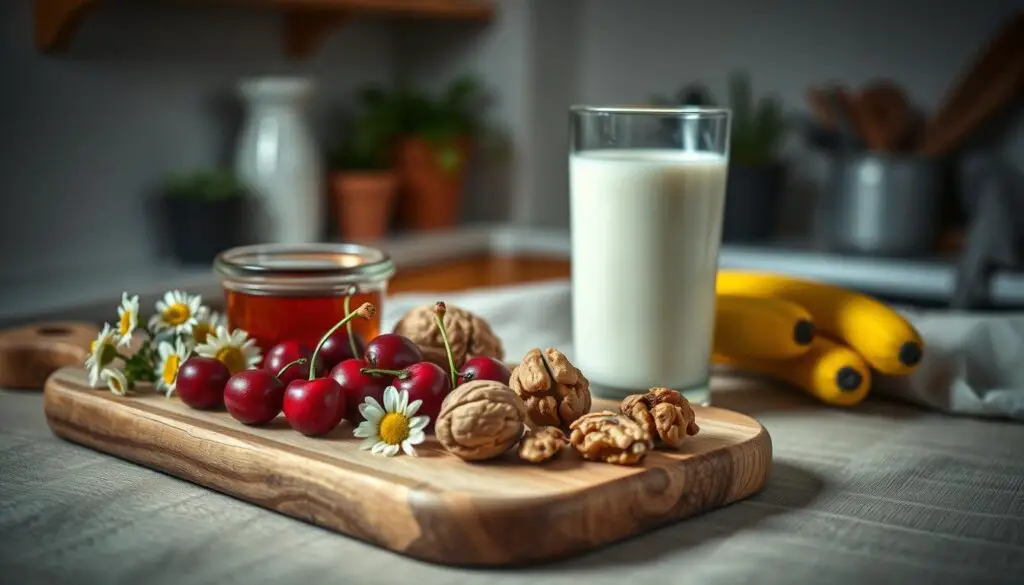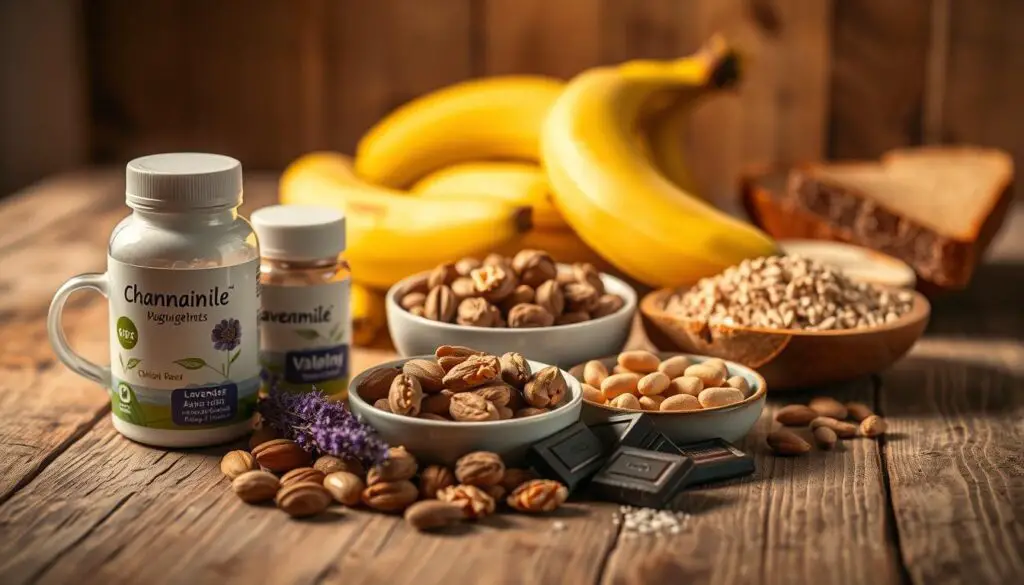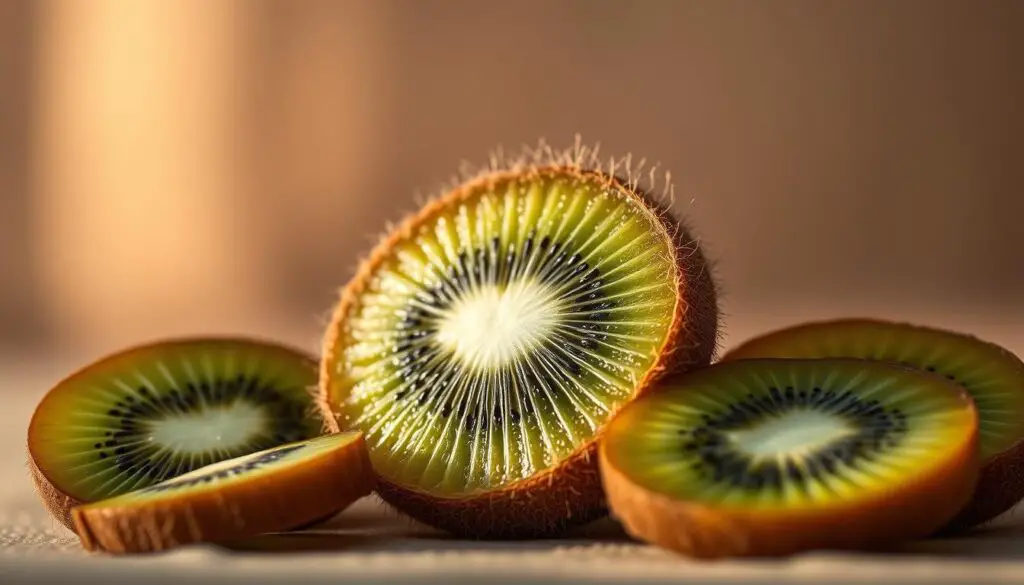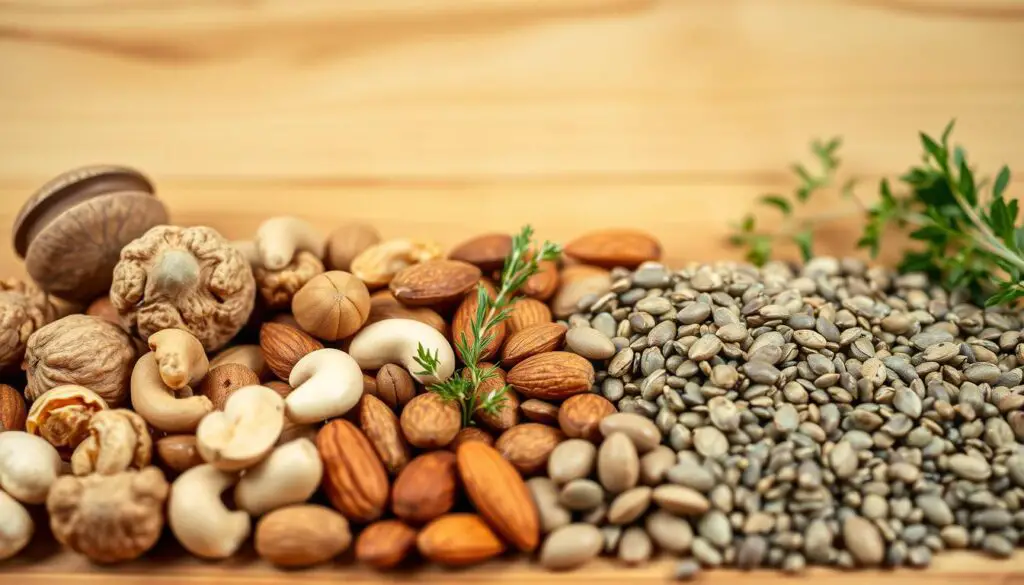
Are you tired of tossing and turning at night? Certain foods can promote better sleep by providing essential nutrients. Adding the right foods to your diet can greatly improve your sleep quality.
Improving your sleep is possible by eating natural foods that aid in relaxation. Kiwi, cherries, milk, fatty fish, nuts, and rice are great for deeper sleep. Simple diet changes can help you wake up feeling refreshed and revitalized.
Key Takeaways
- Eat foods rich in melatonin to regulate sleep
- Include tryptophan-rich foods to promote relaxation
- Consume complex carbohydrates to increase serotonin levels
- Avoid heavy meals close to bedtime
- Try cherries or cherry juice for natural sleep aid
Understanding the Connection Between Diet and Sleep
Nutrition plays a big role in getting better sleep. Some foods help you sleep well. The link between diet and sleep is complex, with many nutrients affecting sleep quality.
How Food Affects Your Sleep Cycle
What you eat can change your sleep cycle. Foods high in fiber and low in bad fats and simple carbs help sleep. Certain nutrients are key in controlling sleep patterns.
Key factors that influence sleep include:
- Tryptophan: An amino acid that helps produce serotonin and melatonin, neurotransmitters that regulate sleep.
- Magnesium: A mineral that can help relax the body and promote better sleep quality.
- Melatonin: A hormone that directly influences the sleep-wake cycle.
The Role of Nutrients in Sleep Quality
Nutrients are vital for good sleep quality. Eating foods rich in the right nutrients can make sleep longer and deeper.
The importance of nutrients for sleep is multifaceted:
- A diet rich in fruits, vegetables, and whole grains can provide the necessary nutrients for optimal sleep.
- Avoiding heavy meals close to bedtime can prevent discomfort and indigestion that might disrupt sleep.
- Including foods that are natural sources of sleep-promoting compounds can enhance sleep quality.
By knowing how foods and nutrients affect sleep, you can choose better to sleep naturally.
The Science of Sleep-Promoting Foods

Research shows that certain foods can improve sleep quality. Foods like kiwi, tart cherries, and fatty fish are good for sleep. Knowing how these foods work in our bodies helps us choose better foods for sleep.
Key Nutrients That Improve Sleep
Several nutrients are key for better sleep. These include melatonin, serotonin, and magnesium. Melatonin helps control our sleep-wake cycles. Serotonin reduces stress and anxiety, making it easier to fall asleep. Magnesium relaxes the body and helps us sleep deeper.
Eating foods rich in these nutrients can help improve sleep. For example, tart cherries are a natural melatonin source. Fatty fish like salmon are high in serotonin.
| Nutrient | Food Sources | Benefit for Sleep |
|---|---|---|
| Melatonin | Tart cherries, walnuts | Regulates sleep-wake cycles |
| Serotonin | Fatty fish, turkey | Reduces stress and anxiety |
| Magnesium | Nuts, seeds, dark leafy greens | Relaxes the body, promotes deeper sleep |
How Your Body Processes Sleep-Inducing Compounds
The body processes sleep-inducing compounds in different ways. For example, eating foods rich in tryptophan, like turkey or chicken, helps make serotonin and melatonin. This involves several biochemical steps that lead to hormone production.
The Timing Factor in Sleep Nutrition
The timing of meals affects sleep quality. Eating foods that promote sleep too close to bedtime can have mixed effects. Some foods might help you sleep, while others could cause discomfort or indigestion.
Eating a balanced meal with sleep-promoting foods a few hours before bed is best. This allows for digestion and nutrient use. For instance, having a snack with magnesium-rich nuts about an hour before bed can relax your muscles and prepare you for sleep.
Tart Cherries: Nature’s Melatonin Powerhouse
Tart cherries are packed with melatonin, a hormone that helps us sleep. Eating foods high in melatonin can make our sleep better. This means we can sleep longer and more soundly.
Why Tart Cherries Promote Better Sleep
Tart cherries are a rare natural source of melatonin. Drinking tart cherry products boosts melatonin in our bodies. This leads to a good night’s sleep. The anthocyanins in tart cherries also fight inflammation, helping us sleep better.
Best Ways to Incorporate Tart Cherries Into Your Diet
There are many ways to add tart cherries to your day. Here are some ideas:
- Tart cherry juice: A glass before bed can help you sleep better.
- Dried tart cherries: Mix them into oatmeal or yogurt for a healthy snack.
- Tart cherry supplements: Capsules or powder are easy to use.
Research-Backed Benefits for Sleep Quality
Many studies show tart cherries help us sleep better. A study in the Journal of Medicinal Food found tart cherry juice helps older adults with insomnia sleep better.
“Tart cherry juice has been shown to increase melatonin levels and improve sleep quality in various populations.”
This research backs up using tart cherries to improve sleep.
Adding tart cherries to your diet can naturally boost your sleep. You can have them as juice, dried fruit, or supplements. The important thing is to eat them regularly to see the sleep benefits.
Kiwi Fruit: The Surprising Sleep Enhancer

Kiwi fruit is becoming a surprising ally for better sleep. This small, furry fruit is full of nutrients that help regulate sleep. It also improves the quality of your rest.
Sleep-Promoting Nutrients in Kiwi
Kiwi is rich in antioxidants and serotonin, key for sleep. Serotonin helps control when we sleep and wake. Eating kiwi before bed may boost serotonin levels, leading to a good night’s sleep.
Kiwi also has folate, vitamin C, and potassium. These nutrients support overall health. They may also help reduce stress and promote relaxation, aiding in better sleep.
How to Enjoy Kiwi for Better Sleep
Eating kiwi is easy and can be done in many ways. You can have it as a snack, add it to cereal, or blend it into a smoothie. For the best sleep benefits, eat kiwi about an hour before bed.
- Slice a kiwi and enjoy it with a dollop of yogurt.
- Add kiwi to your favorite fruit salad.
- Blend kiwi into a pre-bedtime smoothie with other sleep-friendly ingredients like banana or almond milk.
Scientific Evidence Supporting Kiwi for Sleep
Research shows that eating kiwi before bed can enhance sleep quality. A study found that two kiwis eaten one hour before bed improved sleep efficiency. It also reduced wakefulness in adults with sleep issues.
The scientific evidence backs up the benefits of kiwi for sleep. It makes a great addition to your diet if you’re having trouble sleeping.
Fatty Fish: Omega-3s for Deeper Sleep
Omega-3 rich fatty fish can greatly improve your sleep. They are packed with omega-3 fatty acids. These are key for health and help you sleep better.
How Omega-3s Improve Sleep Quality
Omega-3s in fatty fish cut down on inflammation and lead to better sleep. Eating fatty fish can make your sleep quality better. It helps your body’s clock and eases sleep disorders.
Key Benefits of Omega-3s for Sleep:
- Reduces inflammation that can disrupt sleep
- Regulates the body’s internal clock
- Improves symptoms of sleep disorders
Best Types of Fish for Sleep Benefits
Not all fatty fish are the same for sleep. Here are the top fish for your diet:
| Type of Fish | Omega-3 Content | Sleep Benefits |
|---|---|---|
| Salmon | High | Reduces inflammation, promotes relaxation |
| Sardines | High | Rich in vitamin D, supports sleep regulation |
| Mackerel | High | Anti-inflammatory properties, improves sleep quality |
Simple Fatty Fish Recipes for Better Sleep
Adding fatty fish to your meals is easy and tasty. Here’s a simple recipe to start with:
“Grilled salmon with a side of roasted vegetables makes for a perfect dinner that can help improve your sleep quality.”
Try this simple grilled salmon recipe:
- Season salmon fillets with salt, pepper, and lemon juice
- Grill over medium heat for 4-6 minutes per side
- Serve with roasted vegetables like asparagus or Brussels sprouts
By adding fatty fish to your meals and making them simple and tasty, you can improve your sleep a lot.
Nuts and Seeds: Magnesium-Rich Sleep Supporters

Nuts and seeds are great for snacking and are full of magnesium. This mineral helps control sleep patterns. Adding them to your diet can improve your sleep quality.
The Sleep-Magnesium Connection
Magnesium is key for regulating the body’s clock and promoting relaxation. It helps the body make melatonin, the sleep hormone. A diet rich in magnesium can help alleviate sleep disorders and improve sleep quality.
Studies show magnesium deficiency can cause sleep issues like insomnia. Eating magnesium-rich foods like nuts and seeds helps keep sleep patterns healthy.
Top Nuts and Seeds for Sleep Enhancement
Some nuts and seeds are very high in magnesium, making them great for a bedtime snack. Here are some top picks:
- Almonds: Rich in magnesium and protein, almonds are a satisfying snack that can help promote better sleep.
- Pumpkin Seeds: High in magnesium and zinc, pumpkin seeds can help relax the body and promote a restful night’s sleep.
- Sesame Seeds: These tiny seeds are packed with magnesium and can be easily incorporated into your diet by adding them to meals or snacks.
- Cashews: Cashews are not only a good source of magnesium but also contain copper, a mineral that helps regulate sleep.
Ideal Portion Sizes for Bedtime Consumption
While nuts and seeds are good for sleep, eating them in moderation is key because of their high calories. A small handful, or about 1 ounce (28 grams), is a good serving size. This amount gives a magnesium boost without too many calories.
To make the most of your bedtime snack, pair nuts or seeds with other sleep-promoting foods. Try dried fruits or a small banana. This mix can help create a calming bedtime routine that tells your body it’s time to sleep.
Herbal Teas: Calming Beverages for Better Rest
As evening comes, a soothing cup of herbal tea can be perfect for a good night’s sleep. Herbal teas are known for their calming effects and ability to relax. They are great for a bedtime routine.
Chamomile: The Classic Sleep Aid
Chamomile tea is famous for helping you sleep. It has a calming effect thanks to a compound called apigenin. This compound may help reduce anxiety and make you sleepy. Drinking chamomile tea 30 minutes before bed tells your body it’s time to sleep.
Valerian Root: The Powerful Sedative
Valerian root tea is a top choice for natural sleep help. It has been used for ages to improve sleep and make falling asleep easier. Its calming effects help your nervous system relax, leading to deep sleep.
Lavender and Passionflower Options
Other teas like lavender and passionflower also help with relaxation and sleep. Lavender tea calms you down, while passionflower tea treats anxiety and insomnia. Trying different teas can help you find your favorite.
Creating an Effective Bedtime Tea Ritual
To get the most from herbal teas, make a bedtime ritual. This could be brewing tea, enjoying it slowly, and doing relaxing things like reading or meditation. Adding herbal tea to your evening routine helps your body get ready for sleep.
By making herbal teas part of your evening, you can greatly improve your sleep and well-being.
Making the Healthy Choice: Creating a Sleep-Promoting Meal Plan
Creating a meal plan that helps you sleep better is key. Choose foods that help you sleep and avoid those that don’t. This can make your sleep much better.
Combining Sleep-Friendly Foods for Maximum Benefit
To get the most out of your meal plan, mix foods that help you sleep. For example, eating turkey with whole grain bread can help you relax. This is because turkey has tryptophan and bread has complex carbs.
Nutrients to Focus On:
- Tryptophan: Found in turkey, chicken, and fish
- Magnesium: Abundant in nuts, seeds, and leafy greens
- Melatonin: Naturally occurring in tart cherries
- Complex Carbohydrates: Whole grains, fruits, and vegetables
Foods to Avoid Before Bedtime
Some foods can mess with your sleep. Stay away from caffeine, alcohol, and big meals before bed. They can all hurt your sleep quality.
Caffeine in coffee, tea, and chocolate can keep you awake. Alcohol might make you sleepy at first but can mess with your sleep later. Heavy meals can cause stomach problems and make it hard to sleep.
Sample Weekly Meal Plan for Better Sleep
Here’s a meal plan to get you started:
| Day | Breakfast | Dinner | Before Bed Snack |
|---|---|---|---|
| Monday | Oatmeal with banana and almond milk | Grilled salmon with quinoa and steamed broccoli | Tart cherry juice |
| Tuesday | Whole grain toast with avocado and eggs | Turkey breast with roasted vegetables and brown rice | Walnuts and a banana |
| Wednesday | Smoothie bowl with spinach, banana, and almond milk topped with almonds | Grilled chicken with sweet potato and green beans | Chamomile tea |
Stick to this meal plan and avoid foods that mess with your sleep. This can make your sleep much better.
Practical Tips for Incorporating Sleep-Enhancing Foods
To get the most out of sleep-enhancing foods, you need to time them right and follow healthy sleep habits. Knowing how to use these foods in your diet is key.
The Ideal Timing Window for Sleep-Promoting Foods
Eating sleep-promoting foods at the right time is key. Studies show that eating them 1-2 hours before bed can boost sleep quality. For example, a tart cherry juice or a kiwi snack in the evening can help you sleep better.
- Eat sleep-promoting foods like nuts and seeds as an evening snack.
- Consume fatty fish for dinner to benefit from omega-3s.
- Drink herbal teas like chamomile or valerian root tea about an hour before bed.
Pairing Sleep Foods with Other Healthy Sleep Habits
While sleep-enhancing foods can greatly improve sleep, they work best with other healthy habits. Here are some tips to make your sleep environment better:
- Maintain a consistent sleep schedule.
- Create a relaxing bedtime routine, such as reading or meditation.
- Ensure your bedroom is dark, quiet, and cool.
By combining sleep-enhancing foods with these habits, you can greatly improve your sleep. For instance, having a warm glass of almond milk or a herbal tea before bed can help your body wind down.
In conclusion, adding sleep-enhancing foods to your diet is just the start. By knowing when to eat them and combining them with healthy sleep habits, you can get the most out of them. This way, you can enjoy better sleep.
Conclusion: Nourishing Your Way to Better Sleep
Eating the right foods can really help you sleep better. Learning how diet affects sleep helps you make better choices for rest.
Adding sleep-promoting foods to your diet is key for better sleep. Foods with melatonin, omega-3s, and magnesium help your sleep cycle. They make your sleep quality better.
Combine these foods with good sleep habits for even better sleep. Remember, nourishing your body is just the start.
Begin with small changes in your diet and sleep habits. See how your sleep gets better over time. With the right steps, you’ll wake up feeling great and ready for the day.
FAQ
What are some foods that can help me sleep better?
How do tart cherries help with sleep?
Can kiwi really help improve sleep quality?
How do omega-3s in fatty fish promote better sleep?
Are nuts and seeds a good snack before bedtime?
What herbal teas can help with sleep?
How can I create a sleep-promoting meal plan?
What is the ideal timing for consuming sleep-promoting foods?
Can sleep-promoting foods replace sleep medication?
How can I maximize the benefits of sleep-enhancing foods?
Share :
You Might Also Like







